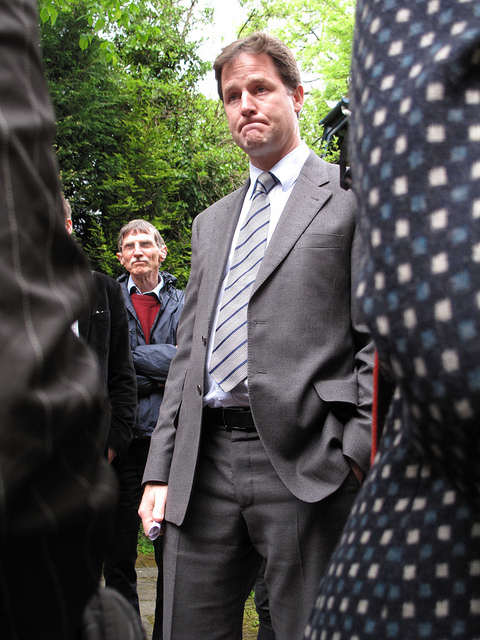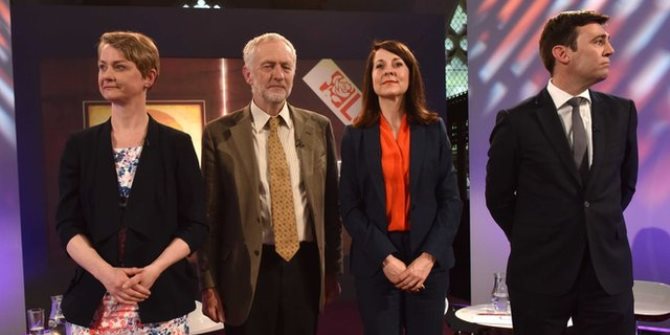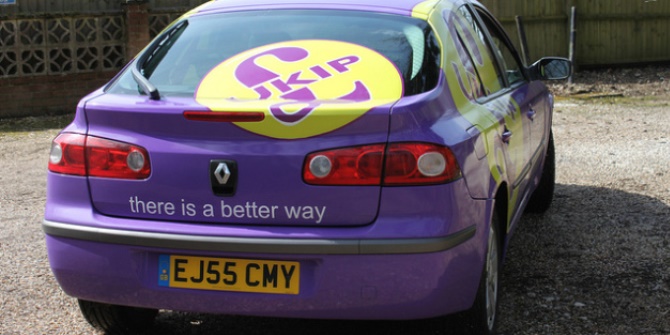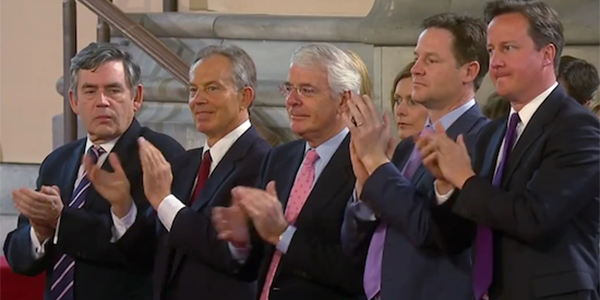 Following disastrous results in the European and local elections, calls for Nick Clegg to step down as leader of the Liberal Democrats have grown stronger. Lord Oakeshott, a Lib Dem peer, has today resigned after it has emerged that he commissioned polls showing that sitting Lib Dem MPs would be trounced if Clegg remained leader. Nevertheless, Tim Oliver still sees hope for the future. They are the lease impacted by the rise of UKIP (and may even benefit from Labour’s susceptibility), Oakeshott’s poll also reveals many Lib Dem MPs will be hard to unseat, and Clegg is unlikely to face another leadership challenge before next May.
Following disastrous results in the European and local elections, calls for Nick Clegg to step down as leader of the Liberal Democrats have grown stronger. Lord Oakeshott, a Lib Dem peer, has today resigned after it has emerged that he commissioned polls showing that sitting Lib Dem MPs would be trounced if Clegg remained leader. Nevertheless, Tim Oliver still sees hope for the future. They are the lease impacted by the rise of UKIP (and may even benefit from Labour’s susceptibility), Oakeshott’s poll also reveals many Lib Dem MPs will be hard to unseat, and Clegg is unlikely to face another leadership challenge before next May.
The European and local elections were disastrous for the Liberal Democrats. With a single MEP left, and with the loss of over 300 councillors, the party emerged from the trauma of Thursday battered and bruised. It was unsurprising that there was an attempt to change leader launched in the aftermath of these results. Lib Dems 4 Change launched their online petition on Friday, and the debate within the party only grew more intense as the weekend wore on, and the party’s grim European results were announced. It culminated with the leak to The Guardian of an ICM poll in 4 Lib Dem held seats, which apparently showed that all the incumbents would lose, often by impressive margins, if Nick Clegg remained leader, and that the damage would be contained somewhat if another person; Vince Cable or Tim Farron, were made leader.
 This managed to make an already torrid time for the Liberal Democrats even worse, especially when it was figured out, first on Twitter and then by Charlotte Henry at The Spectator that the source of the ICM poll was Matthew Oakeshott. Lord Oakeshott was widely known as the leading ally of Vince Cable and critic of the coalition government, and given his personal wealth and the connection to the Social Liberal Forum, which has often been ill at-ease with the coalition’s policies, he had both the means and the reason to commission such a poll. Unfortunately for everyone involved, the plot spectacularly backfired; an internal poll showed that a majority of members still backed Clegg as leader and Vince Cable issued a statement condemning what had happened. The end result of this has been Lord Oakeshott leaving the party and releasing a fifth seat poll; in Danny Alexander’s seat, again showing a dismal Lib Dem performance.
This managed to make an already torrid time for the Liberal Democrats even worse, especially when it was figured out, first on Twitter and then by Charlotte Henry at The Spectator that the source of the ICM poll was Matthew Oakeshott. Lord Oakeshott was widely known as the leading ally of Vince Cable and critic of the coalition government, and given his personal wealth and the connection to the Social Liberal Forum, which has often been ill at-ease with the coalition’s policies, he had both the means and the reason to commission such a poll. Unfortunately for everyone involved, the plot spectacularly backfired; an internal poll showed that a majority of members still backed Clegg as leader and Vince Cable issued a statement condemning what had happened. The end result of this has been Lord Oakeshott leaving the party and releasing a fifth seat poll; in Danny Alexander’s seat, again showing a dismal Lib Dem performance.
The whole scenario has been a total debacle for the party. Not only have they had to endure another election night to forget, including being wiped out on several councils, but they have also given up several days of media coverage to discussion of how fractious and ill-disciplined they are; a break from long established narratives about how united they’d been even in the face of this electoral storm. The party has lost more than elected representatives; it has also lost one of the few potential positives for it in the media, that it was capable of sticking together and getting the job done. The overall number of signatures on petitions such as that written by Lib Dems 4 Change is, ultimately, irrelevant if the coverage of the party focuses on them rather than anything else.
This is all horrific news, then, for the Liberal Democrats. But hidden among the wreckage of Thursday, and even in Lord Oakeshott’s methodologically shambolic poll, there are things that should give the party hope for the future. Out of the three larger parties, their vote share was least impacted by the rise of UKIP in wards they held; but only just. This, coupled with the new discovery (at least, new to some commentators in the media) that UKIP can take voters from Labour in significant numbers may help them hold more seats come next May. Secondly, what little good the ICM poll did do was to remind us that Liberal Democrat MPs have strong incumbency advantages; apart from Clegg, all the seats covered had a high approval rating of their MP, and this will make it even harder to unseat them come next May. Perhaps of less comfort, but nonetheless still important, is that most polls still show that changing leader would make precious little difference to the party’s electoral fortunes.
The party now faces perhaps an even bigger challenge – to position itself well ahead of the next general election. Given how spectacularly the leadership coup attempt failed, it’s unlikely Clegg will be challenged before next May, which will bolster his negotiating position as the coalition is wound up. The party has to figure out, not only how to untangle the coalition, but how to do so in a way that doesn’t scare voters away by making them seem flaky and indecisive. This goes with the Scottish referendum, the autumn statement and the budget on long list of careful balancing acts for the party to perform, in a way that both protects its achievements in government and gives it a strong platform in 2015. At least Clegg can cross leadership fears off his list of things to worry about, though, thanks to Lord Oakeshott.
Note: This article gives the views of the author, and not the position of the British Politics and Policy blog, nor of the London School of Economics. Please read our comments policy before posting. Image credit: 38 degrees
About the Author
 Tim Oliver is a PhD student at the Centre for British Politics in the School of Politics, Philosophy and International Studies at the University of Hull, writing a thesis on Britain as a Great Power. He tweets from @Aremay
Tim Oliver is a PhD student at the Centre for British Politics in the School of Politics, Philosophy and International Studies at the University of Hull, writing a thesis on Britain as a Great Power. He tweets from @Aremay







